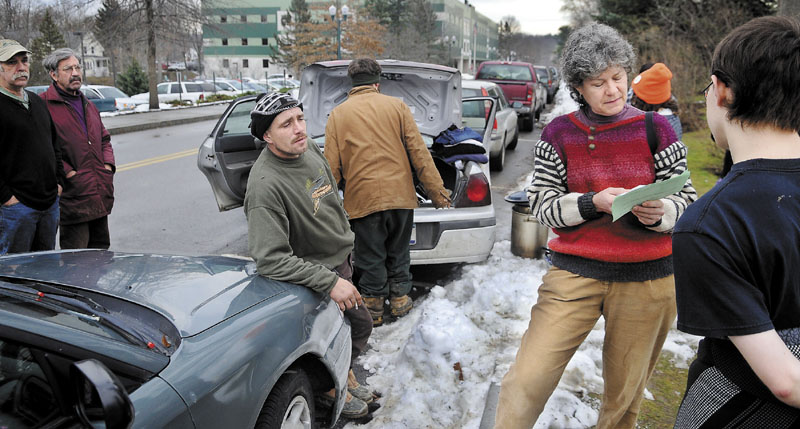AUGUSTA — Diane H. Messer, one of nine people accused of failing to leave the Blaine House grounds in November, is on trial today in Kennebec County Superior Court on a charge of criminal trespass.
Closing arguments and jury deliberation are expected later this afternoon.
The other co-defendants, all of whom pleaded not guilty and requested jury trials, and their attorneys will be closely watching the outcome of Messer’s trial. Those co-defendants, several of them who were in the courtroom for the start of Messer’s trial this morning, are scheduled for hearings in the next few weeks.
Messer, 59, of Liberty, is represented by attorneys Philip Worden and Lynne Williams.
The case faced a potential mistrial this morning when a
spectator tried to show to jurors a sign on 8 1/2-by-11 paper saying, “Jury Nullification, Article 1 Sec. 4” That portion of the Maine Constitution refers to freedom of speech and how a jury determines law and fact.
The court officer took the sign, escorted the man out, and the state sought a mistrial.
Justice Nancy Mills questioned each juror individually in the courtroom, asking if they had seen the sign, and none had. Mills refused to declare a mistrial.
A jury consisting of 11 women and three men was selected March 8, and the judge read off a list of eight law enforcement officers, either Maine State Police troopers or Capitol Security officers, who might be called to testify at the trial.
Messer and the other co-defendents were arrested Nov. 27, 2011, after being ordered by police to leave the Blaine House grounds. They were protesting a recent decision by officials to require a permit for the Occupy Augusta group to continue operating a tent city at Capitol Park.
Other potential witnesses during the trial are the eight co-defendants facing criminal trespass charges as a result of the same incident: Elizabeth Burke, 48, of Union; Gregory M. Fahy, 44, of Augusta; Jenny Gray, 54, and Patricia L. Messier, 63, both of Wiscasset; Michael Reynolds, 38, of Lewiston, Kimberley Cormier, 47, a Benton selectwoman; James Freeman, 62, of Verona Island, and David J. Page, 44, of Surry.
The maximum penalty for criminal trespass, charged as a Class E misdemeanor, is 180 days in jail.
The prosecutor, Assistant District Attorney James Mitchell Jr., declined to say whether the state will ask for jail time. He told the jury that Messer refused to leave despite being ordered to do so by Maine State Police troopers.
In his opening statement, Worden said Messer will admit being on the grounds of the Blaine House, also known as the governor’s mansion, and refusing to leave.
“She believed it was her right to be there and protest the closure of an encampment in Capitol Park,” Worden said.
Worden said Thursday he researched similar cases and said those convicted were spared jail time and frequently ordered to perform community service.
On March 8, potential jurors were asked whether they themselves had been involved in a demonstration, strike or political protest, whether they had been associated with the Occupy Augusta movement — two had. They were also asked whether they believed there should be stricter legal controls on political protests or protesters, and — with no explanation offered — whether they had been involved in financial services.
Messer was the Democratic candidate for the Maine Senate from Waldo County in 2008.
She was also one of two lead plaintiffs in a federal case that rose from the Augusta Occupy movement where the protesters challenged the state’s right to require permits to camp in Capitol Park, located in front of the State House.
Attorney Williams filed the lawsuit Nov. 28, to try to get a court order to prevent Capitol Police from evicting Occupy Augusta participants. The lawsuit claimed that requiring protesters to obtain a permit to continue the vigil in Capitol Park violated their rights to free speech. Williams had argued that occupying a public space was an essential part of the group’s message and was thus communicative, and protected, speech.
Federal District Court Judge Nancy Torreson ruled on Dec. 7, 2011, that while the temporary “tent city” in the park was protected by the First Amendment, the state had the right to place reasonable restrictions on the time, place and manner of the protest by requiring the occupiers to get a permit, and banning camping in the park, which is owned and managed by the state.
The protesters left the part shortly afterward.
Send questions/comments to the editors.



